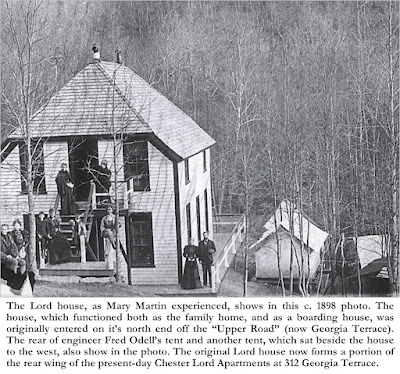 |
| Chester Case Lord |
Capt Thomas Munson > Samuel Munson > Samuel James Munson > William Munson > William Munson II> Seba Munson > George Pardee Munson > Julia Elizabeth Munson m. Chester Case Lord
Chester Lord was born in Killingworth, CT, 09 Sep 1857, but lived with his family in Cheshire after his birth. He was the son of Benjmain and Antoinette Goodrich Case Lord. In 1883, he married Juline Louisa Atwater, daughter of Elizur Punderson and Julia Augusta Hemingway Atwater. Juline was five years Chester's senior. Chester farmed with Juline's father for several years. During this time, he was a fervent advocate of the Grange Movement and led the charge in Cheshire to institute The Grange in 1885 [1].
The Patrons of Husbandry, or the Grange, was founded in 1867 to advance methods of agriculture, as well as to promote the social and economic needs of farmers in the United States. The financial crisis of 1873, along with falling crop prices, increases in railroad fees to ship crops, and Congress’s reduction of paper money in favor of gold and silver devastated farmers’ livelihoods and caused a surge in Grange membership in the mid-1870s. Both at the state and national level, Grangers gave their support to reform-minded groups such as the Greenback Party, the Populist Party, and, eventually, the Progressives.[2]
In 1889, he was a foreman at hardware manufacturer Sargent & Co. in New Haven. Lord's health was suffering, so he decided to move to a better climate in 1897. His wife, Juline, and young children, Robert Atwater Lord (1887-1972) and Margery Juline Lord (1891-1984) remained in New Haven while he scouted a new place to live in The Mountain Retreat, Buncombe County, North Carolina.
The Mountain Retreat sat nestled in between mountains on three sides. It was selected by the evangelist Rev John C Collins, of New Haven who wanted to create a mountain retreat community and a health resort for rescue mission workers. The first program was held in July 1897. Think annual tent camp religion. People would come and gather, sleep in platform tents and worship in large open areas, seated at benches in the great outdoors. The retreat grew and the village became Montreat. I higly recommend reading the full story of the retreat here.
C C Lord and family became the first residents of Montreat and built the first house in the area. The home was 18 x 24 and two stories. [5] After the house was built, the family, wife Juline, son Robert Atwater Lord (1887-1972) and Margery Lord (1891-1981) joined Chester in Montreat in 1898. The family hosted boarders who were missionaries who were looking for respite after serving their tours of duty. After just months in Montreat, Lord's health was improved and he put on twenty pounds, according to his Connecticut doctor who had visited the Lord's in North Carolina.
 |
| Photo: Preservation Society of Asheville Buncombe |
 |
| Photo: Preservation Society of Asheville Buncombe |
By 1899, the village continued to grow, particularly during the summer months. Montreat sported a school, post office, hotel, circulating library and a temporary bank. Housing was booming too and 20 new cottages were built. Montreat was on its way.
 |
| Elizabeth Munson Lord |
The Lord's had brought Juline's mother down to Montreat in 1899 and she suddenly died of pneumonia. Months later, Juline Atwater Lord died on September 28, 1900. She left now 12-year-old Robert and 8-year-old Margery. Juline was just 48. The children were left well-provided the inheritance Juline left and the money would even send Margery to medical school years later.
Just a year later, on 11 Oct 1901, C C went to New Haven and married Julia Elizabeth Munson. Julia went by Elizabeth. Elizabeth was a first cousin to Juline. Julia's mother was sister to Juline's father.
The lives of the Lords went on in Montreat. C C joined the board of the Mountain Retreat Association, which was in charge of all parts of development in Montreat. He became the Secretary/Recorder of the management committee. He also served in several other capacities, including as general manager in 1904.
Housing was of foremost concern during the "tourist" months. Lord built a 2-story boarding house for the coming summer that was named, "Truda" on the Lord property. It became a very popular destination within Montreat.
 |
| Chester and Elizabeth Lord in front of their Truda Cottage Photo: Preservation Society of Ashville Bumcombe |
Lord had fingers in lots of pies in Montreat. In addition to running his boarding house and civic activities, he also became a bit of a real estate developer. He would take unimproved lots and improve them and sell them at a profit.
 |
| Photo: Preservation Society of Ashevill Buncombe |
[1]The Connecticut Granges: An Historical Account of the Rise and Growth of the Patrons of Husbandry : Sketches of the State, Pomona, and Subordinate Granges of Connecticut, with Valuable Statistics, Notices of Prominent Members, Portraits, and Illustrations; New Haven Publishing Company, New Haven, Connecticut, 1900
[2] The Gilder Lehman Institute of American History, History Resources, The Grange Movement 1875; https://www.gilderlehrman.org/history-resources/spotlight-primary-source/grange-movement-1875
[3] Presbyterian Heritage Center, History, retrieved 7/10/22, https://phcmontreat.org/montreathistory-Collins-Gales.htm
[4] Preservation Society of Asheville, Buncombe, retrieved 7/10/22, https://psabc.org/chester-lord-of-lord-place-and-the-start-of-the-pretty-little-religious-village-of-montreat/
[5] The Alumnae Record by Salem College (Winston-Salem, N.C.), 1924
No comments:
Post a Comment